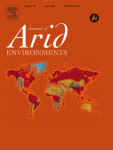Responding to mobility constraints: Recent shifts in resource use practices and herding strategies in the Borana pastoral system, southern Ethiopia
This paper investigates how Borana pastoralists of southern Ethiopia have adapted resource use and livestock mobility practices amid multiple constraints including rising population, loss of rangeland to other pastoral communities and changing access rights, among others. This study uses an innovative multi-scalar methodology to understand how herders' grazing management decisions are made within a context of communal regulations governing access to resources.




